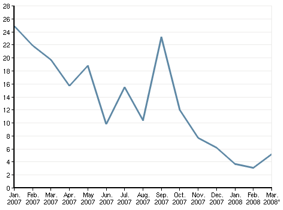NPR Acknowledges Pentagon Propaganda Controversy
Submitted by Bob Burton on
One of the over 75 pundits revealed by the New York Times as being part of the Pentagon military analyst program was Robert H.

Submitted by Bob Burton on
One of the over 75 pundits revealed by the New York Times as being part of the Pentagon military analyst program was Robert H.
Submitted by John Stauber on
 Author Glenn Greenwald notes, "It has now been more than ten days since the New York Times exposed the Pentagon's domestic propaganda program involving retired generals and, still, not a single major news net
Author Glenn Greenwald notes, "It has now been more than ten days since the New York Times exposed the Pentagon's domestic propaganda program involving retired generals and, still, not a single major news net
This Sunday's stunning, front-page New York Times revelations of the Pentagon military analyst program have been met with a wall of silence and cover-up on network television news.
Submitted by Sheldon Rampton on
Submitted by Diane Farsetta on
 In addition to helping research the "Pentagon's pundits" on SourceWatch -- those retired military officers who took part in the Pentagon program to promote Bush Administration talking points on the Iraq and Afghanistan war
In addition to helping research the "Pentagon's pundits" on SourceWatch -- those retired military officers who took part in the Pentagon program to promote Bush Administration talking points on the Iraq and Afghanistan war
Submitted by Diane Farsetta on
On Sunday, the New York Times outed the Pentagon's "military analyst program," an extensive effort to cultivate retired military officers as "message force multipliers" or "surrogates" spouting Bush administration talking points on Iraq and other hot-button issues. We've compiled a list of known participants, and started SourceWatch profiles on each. Can you help us uncover more about the Pentagon's pundits? What did they say, on what news programs?
Submitted by Diane Farsetta on
 In early 2002, as "detailed planning for a possible Iraq invasion" began, then-Assistant Secretary of Defense for Public Affairs Victoria Clarke launched the Pentagon military analyst program as "the main focu
In early 2002, as "detailed planning for a possible Iraq invasion" began, then-Assistant Secretary of Defense for Public Affairs Victoria Clarke launched the Pentagon military analyst program as "the main focu
Submitted by Diane Farsetta on
Why didn't the New York Times cover the "Winter Soldier" hearings organized by Iraq Veterans Against the War (IVAW), during which soldiers testified about their experiences in Iraq?
Submitted by John Stauber on
The pro-war lobby is heading to Washington and the halls of Congress Tuesday, April 8, when General David Petraeus testifies on the continuing war in Iraq.
 "Five years later, the United States remains at war in Iraq, but there are days when it would be hard to tell from a quick look at television news, newspapers and the Internet," observes New York Times reporter Richard Pérez-Peña. "Media attention on Iraq began to wane after the first months of fighting, but as recently as the middle of last year, it was still the most-covered topic. Since then, Iraq coverage by major American news sources has plummeted, to about one-fifth of what it was last summer, according to the Project for Excellence in Journalism."
"Five years later, the United States remains at war in Iraq, but there are days when it would be hard to tell from a quick look at television news, newspapers and the Internet," observes New York Times reporter Richard Pérez-Peña. "Media attention on Iraq began to wane after the first months of fighting, but as recently as the middle of last year, it was still the most-covered topic. Since then, Iraq coverage by major American news sources has plummeted, to about one-fifth of what it was last summer, according to the Project for Excellence in Journalism."
The past week saw a dramatic escalation in violence in Iraq and rising civilian deaths, prompting analysts to warn that "Iraqis may be about to witness a new phase in the cycle of violence ... intra-Shi'ite bloodletting that could tear Iraq apart and more deeply embroil U.S. forces." But even these developments have barely cast a media ripple.
The Iraq war has also been losing ground for attention on the internet, according to a recent report which shows that "the war in Iraq continues to decline in search interest, down 120 percent over the past three and a half years," while interest turns to topics such as Paris Hilton, Ashley Alexandra Dupre, Heath Ledger and the latest YouTube video.
Center for Media and Democracy (CMD)
520 University Ave, Ste 305 • Madison, WI 53703 • (608) 260-9713
CMD is a 501(c)(3) tax-exempt non-profit.
© 1993-2025